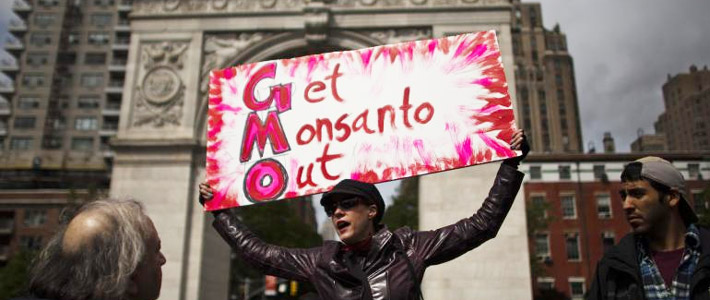
Opponents look set to score a victory in the U.S. Senate by stopping the extension of the controversial rider that protects Monsanto from the courts.
Senate CR to strip Monsanto rider
Politico, 24 September 2013
http://www.politico.com/story/2013/09/senate-continuing-resolution-monsanto-rider-97301.html
A controversial legislative rider added by Monsanto to the Agriculture Department budget last spring will no longer be effective after Sept. 30 under a draft stopgap government funding bill being drafted by Senate Democrats.
The provision touched off a storm last spring as critics accused Monsanto of “court-stripping” to protect its sales of the genetically modified seeds for which the St. Louis-based giant is a pioneer in commercializing.
The continuing resolution approved by the House last week would extend the rider without comment for the first months of the new fiscal year. But the Senate substitute, to be unveiled Wednesday, will explicitly go back and make clear that that Monsanto-backed provision will end this month.
“That provision will be gone,” said Sen. Mark Pryor (D-Ark.), confirming the change to POLITICO. The Center for Food Safety, a Washington-based non-profit, welcomed the decision as “a major victory for the food movement” and “sea change in a political climate that all too often allows corporate earmarks to slide through must-pass legislation.”
“Short-term appropriations bills are not an excuse for Congress to grandfather in bad policy,” said Colin O’Neil, director of government affairs for the Center.
The whole dispute has been overshadowed by the larger fight over Republican efforts to use the same CR to cut off funding needed by President Barack Obama to implement his health care reforms. But for many environmental and food safety groups, the so-called “Monsanto Protection Act” — as the rider was called — became a major cause last spring, generating a huge amount of Internet traffic and calls on Obama to veto the agriculture budget.
Caught in the middle was Appropriations Committee Chairwoman Barbara Mikulski (D-Md.) who had inherited legislative agreements made under her predecessor, the late Sen. Daniel Inouye (D-Hawaii). Mikulski promised then that she would do everything she could to terminate the provision with the new fiscal year. But the CR posed its own challenges since typically the leadership simply extends current spending and related provisions for the life of the resolution.
(Also on POLITICO: Monsanto, DuPont pour millions into GMO fight)
This is essentially what would happen under the House CR running through Dec. 15. Mikulski wants a shorter end date, Nov. 15. And given the Monsanto controversy, she and Pryor, chairman of the agriculture appropriations subcommittee, chose to act and take it out after Sept. 30.
Their decision was helped along by the fact that even early proponents in the House Appropriations Committee appear to have backed away. Indeed the fiscal 2014 agriculture appropriations bill reported by the House panel but never voted upon on the floor, did not extend the rider.
Monsanto and its allies have argued that what the company sought was no more than what some federal courts have done themselves in the past: Allow farmers to continue to use GMO seed –under environmental guidelines—while the court review continues.
Monsanto successfully expanded support among farm groups also interested in some such stewardship program. But the language itself was unusually strong in that it directed Agriculture Secretary Tom Vilsack in no uncertain terms about how he should respond in future court cases impacting GMO seeds.
The secretary “shall, notwithstanding any other provision of law… immediately grant” temporary permits to continue using the seed at the request of a farmer or producer wanting such a stewardship program, the provision reads. And while Vilsack has been a big champion of the biotech industry, he was uncomfortable with what he saw as an effort to “pre-empt judicial review.”
“We have all known this rider’s days were numbered,” O’Neil told POLITICO. “But given the recent GMO contamination episodes of wheat and alfalfa in Oregon and Washington it is clear that our nation’s safeguards, in particular those of the federal courts, should not be under attack from policy riders like this.”









